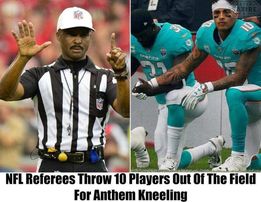
In the ever-evolving intersection of sports and social justice, the NFL has often found itself at the center of heated debates and discussions. The act of kneeling during the national anthem as a form of protest, popularized by former quarterback Colin Kaepernick, continues to be a polarizing issue within the league.
Recently, the NFL referees made headlines when they disqualified ten players for anthem kneeling during a game last week. This incident once again raised questions about the role of athletes in speaking out against social injustices, the league’s policies, and the impact of such protests on the field.
The anthem kneeling protests have become a symbol of dissent against racial inequality and police brutality in the United States. It all began in 2016 when Colin Kaepernick, then a quarterback for the San Francisco 49ers, took a knee during the national anthem as a peaceful protest against these issues. Kaepernick’s silent gesture ignited a nationwide movement, with players from various NFL teams and other sports leagues joining in to show solidarity with the cause.The protests, however, drew mixed reactions from fans, fellow players, and league officials. Some praised the athletes for using their platform to address important societal issues, while others accused them of disrespecting the flag and the country. This divide has persisted and intensified over the years, with the NFL struggling to find a unified stance.
The NFL has faced challenges in responding to anthem kneeling protests. Initially, the league’s response was to discourage players from protesting by instituting a policy that required them to stand during the national anthem. However, the NFL Players Association objected to this policy and filed a grievance. In response, the NFL decided to suspend the policy in 2018, allowing players to remain in the locker room if they didn’t want to stand during the anthem.
This change in policy reflected the league’s recognition of the need to strike a balance between respecting players’ right to express themselves and maintaining a positive image. It allowed players some autonomy while attempting to defuse a contentious issue.